The best part about festivals is the aroma of sweets wafting out of the kitchen.
In India, nothing says festivals like the aroma of roasting gram flour admixed with cardamom. Indeed, cardamom is such an integral part of the cooking in an Indian kitchen that we use the versatile spice in almost everything – desserts, savoury dishes and even in our drinks (chai). One recipe which is a staple in my kitchen is the besan laddu or gram flour laddu. These laddus which are essentially round balls of roasted gram flour and ghee make for a delicious addition to festivities.
However, a critical part of this easy recipe is the roasting of the gram flour. The flour needs consistent stirring. Flour which is roasted less leads to sticky laddus which taste raw. On the contrary, gram flour roasted for too long brings a burnt taste to the mouth which is most abhorrent. So, it is important to roast the flour to the right stage. My step by step picture tutorial will help you understand just how. This recipe has been handed down in my husband’s family for generations. My mother in law taught it to me. It is just five ingredients.
A point to note is that the laddus made with castor sugar give a better texture than the ones made with powdered sugar. Also, I absolutely insist on the twin step infusion of milk. They help to fluff up the gram flour grains.
INGREDIENTS
- 3/4 cup ghee (clarified butter)
- 3 cups (levelled) gram flour. A coarse textured flour is preferred but if you do not have that then just use regular one.
- 1 ½ cup castor sugar
- 1 teaspoon green cardamom powder
- 2 tablespoons whole cream milk
METHOD
- Take a heavy, flat bottomed plan and heat the ghee in it till it is lukewarm. This entire process of roasting the laddus on heat is to be done at a low flame.
- Add the gram flour to the above and stir on low flame till the gram flour is well combined with the ghee.
- Continue to roast, stirring frequently. After about ten minutes, the colour of the gram flour will darken and it will start to emit an aroma. Continue roasting.
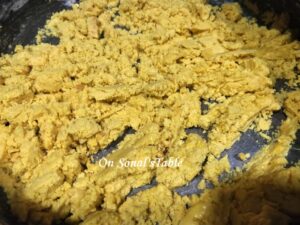
- If you observe that the mixture is too dry, you can add a teaspoon of ghee to it.
- After approximately half an hour of roasting the mixture will not just be fragrant but will also start to release the ghee. The mixture will become soft and will be easy to turn over.
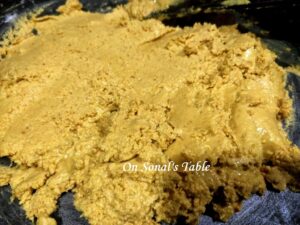
- At the above stage, sprinkle a table spoon of milk into the mixture and stir immediately (stirring immediately is vital). You will observe that the smooth pliability of the mixture will disappear and it will once more become coarse and lumpy. That is fine. We are aiming for that.
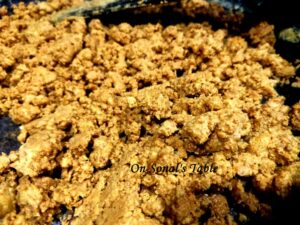
- Continue to stir the above mixture for about 7-8 minutes till it once more becomes soft and pliable.
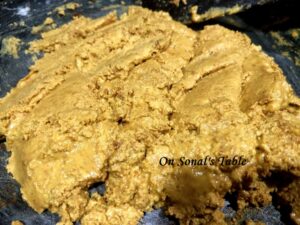
- Add the second tablespoon and repeat the above step.
- Continue roasting till once more the mixture turns soft. After about forty minutes (in total from step 1) you will observe that the flour will change colour and turn a darker shade of brown.
- Turn off the heat and invert the contents on a cooling tray. Let the mixture cool down before adding the cardamom powder.
- When the mixture is cool (aim for only slightly lukewarm) add the sugar. Do not add the sugar when the mixture is hot.
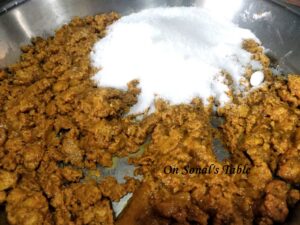
- Mix well and break any lumps that form. If at this stage you find that the mixture is too dry, you can add another teaspoon of ghee. I prefer not to because otherwise the laddus loose their crumbly texture. I aim to make laddus which literally melt in the mouth.
- Take about 2 tablespoons of the mixture in your palms and shape it into a ball. You can shape them into any size that you want.
- Store in an airtight container at room temperature for about 10 days.
- And, don’t forget to thank me for the heavenly taste…nah, just kidding!
 Sonal Singh On Sonal's Table
Sonal Singh On Sonal's Table

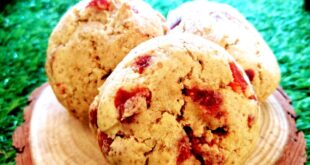

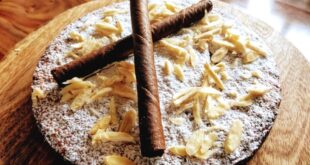
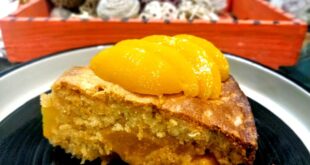
Only wanna input that you have a very decent web site , I the design it really stands out. Shannah Dominick Goff
Thank you. The credit for the site goes to my designer Monica from the Geeks Room.